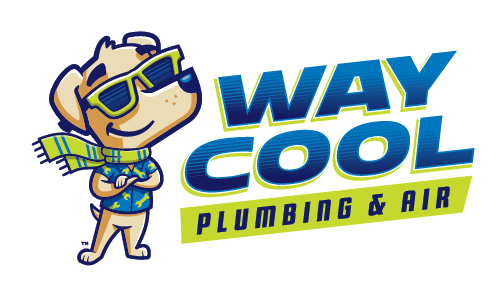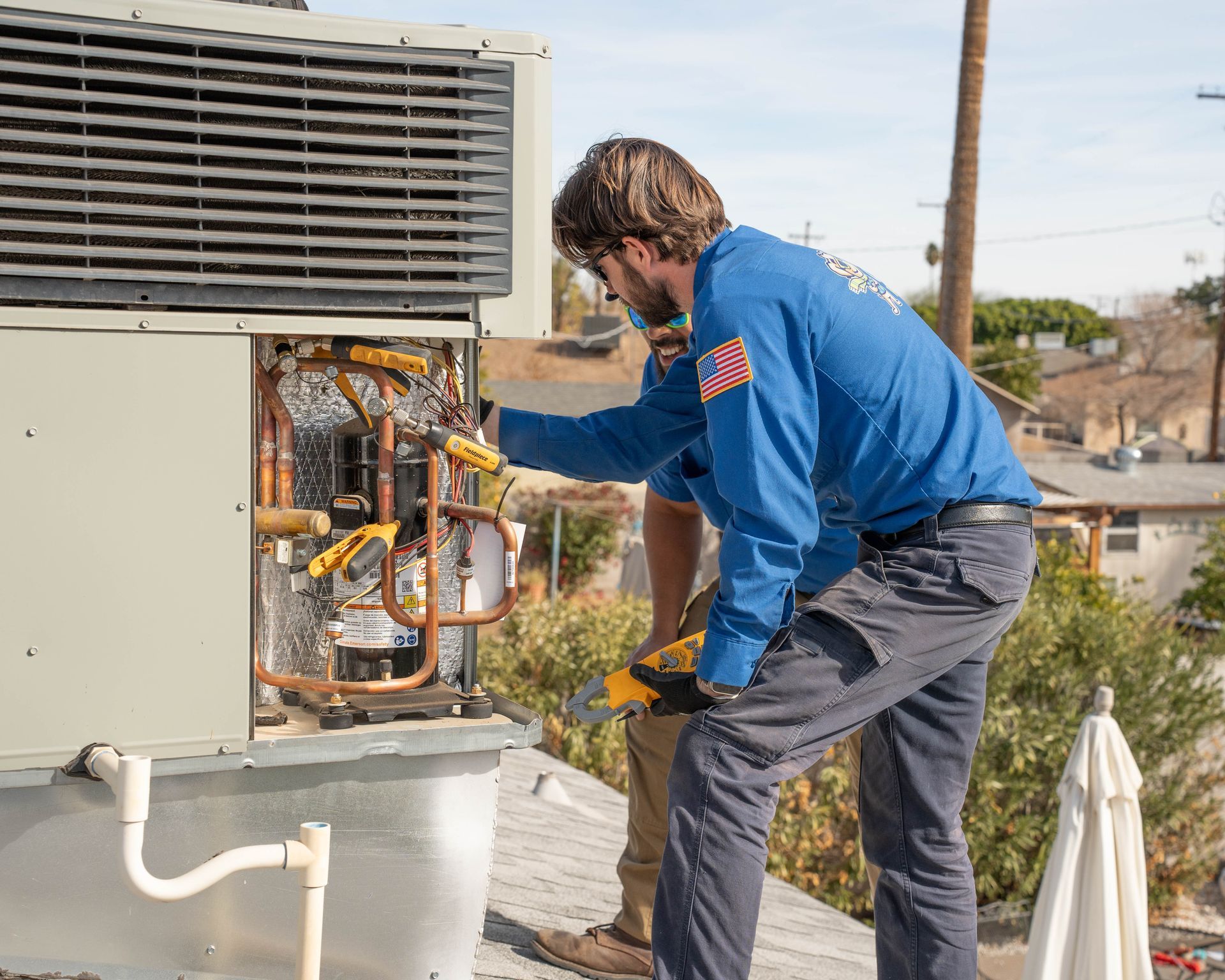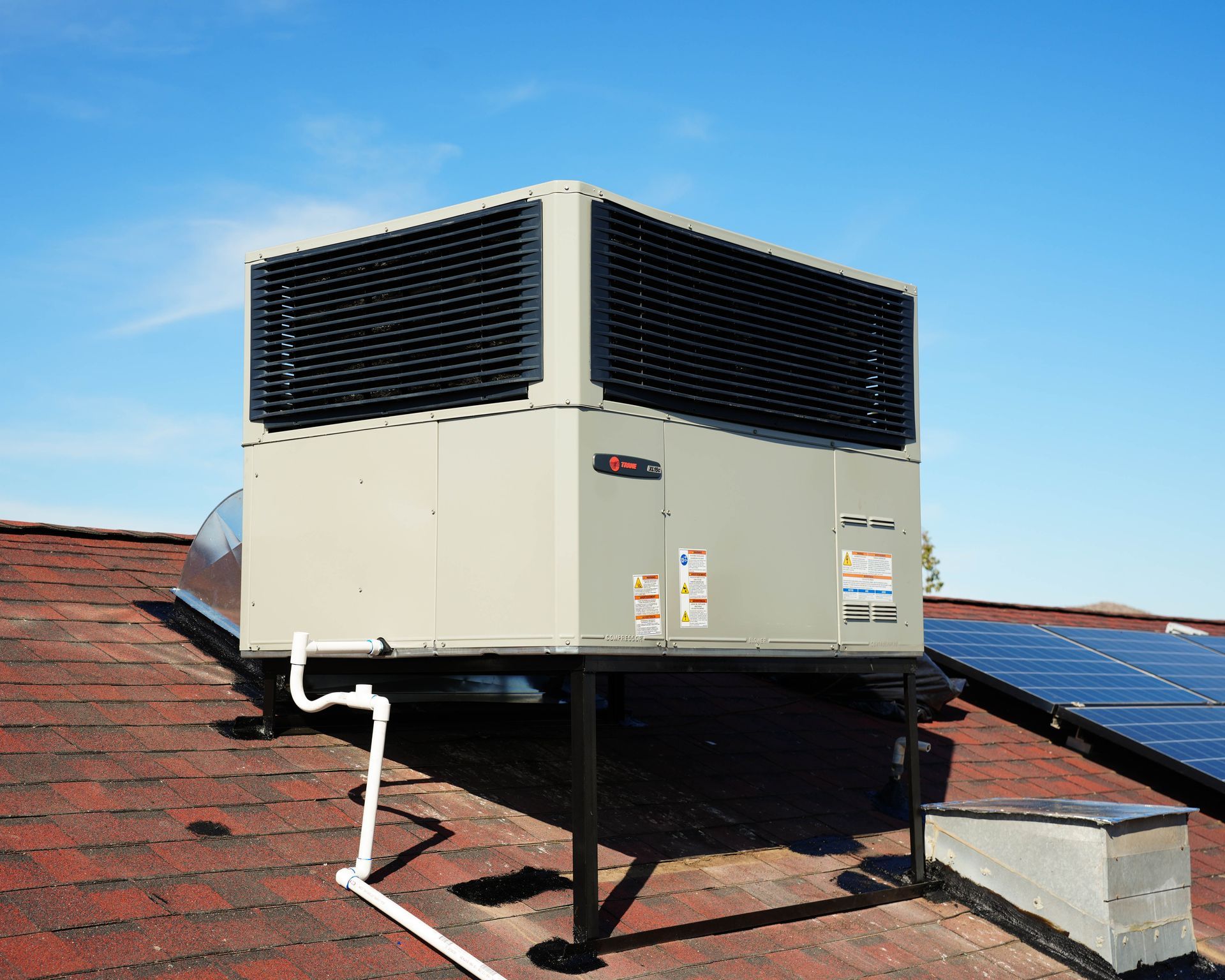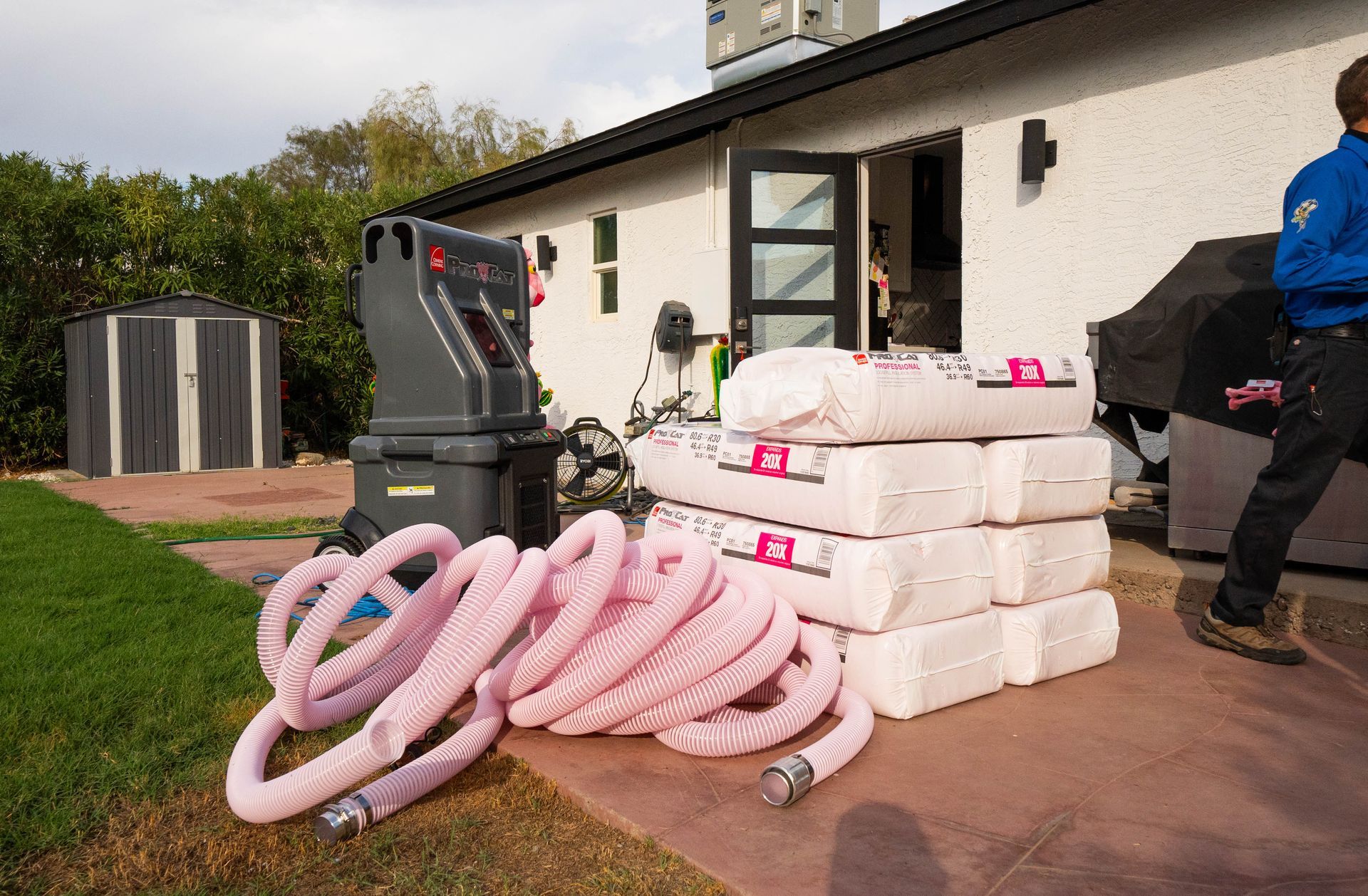Water Heater FAQs for Homeowners
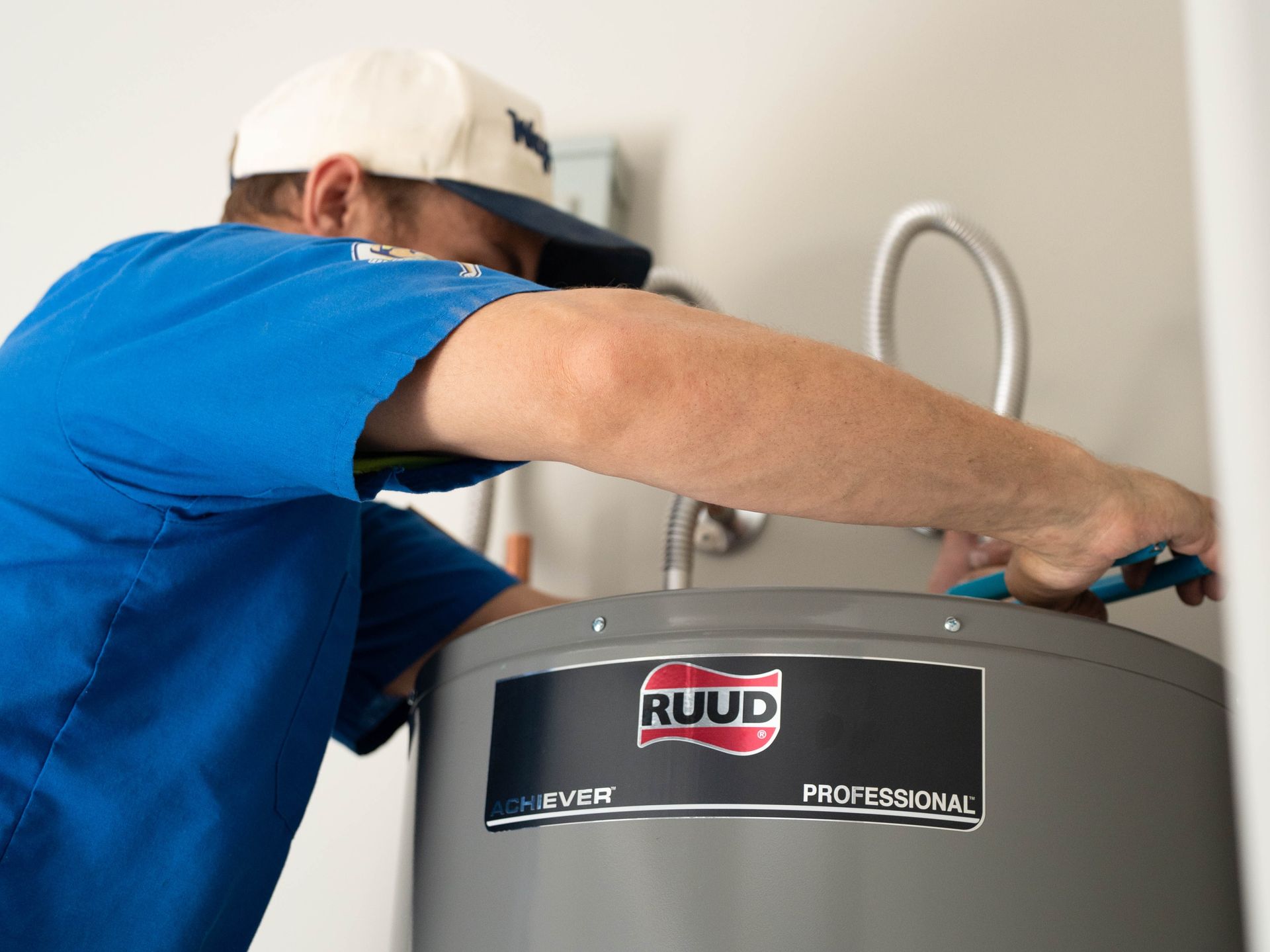
Q: How long do water heaters usually last?
A:
Most traditional tank-style water heaters last about 8 to 12 years on averagebaaqmd.gov. Lifespan can vary based on factors like water quality (Phoenix’s hard water can shorten it), usage, and maintenance. If you have a water softener, that can help reduce mineral buildup and sometimes extend the tank’s life a bit. Tankless water heaters tend to last longer, often 15-20 years, since they don’t store water that can rust them out – but their lifespan also depends on maintenance (they too can suffer from scale buildup). It’s a good idea to check your water heater’s manufacture date (often encoded in the serial number) – if it’s pushing 10+ years and especially if it’s showing any issues, start considering a replacement plan. Better to replace proactively than to come home to a flooded floor from a failed tank.
Q: What are signs my water heater is failing?
A:
There are a few telltale warning signs: lack of hot water or a reduction in the hot water volume (if you notice your showers getting shorter and the hot water runs out faster, the tank could be losing capacity due to sediment). Water temperature variability – if it’s sometimes hot, sometimes lukewarm – can indicate a failing heating element or thermostat in electric units, or burner issues in gas units. Discolored or rusty water coming from your hot tap is a red flag; it often means the tank is corroding internally and rust is leaching into the waterenergystar.gov. Any leaks or moisture around the tank are a serious sign – even a small puddle or occasional drip means the inner tank might be compromised or a fitting is failing. Noises, like loud popping or rumbling when the burner is on, usually mean sediment buildup at the bottom of the tank; the sediment causes hot pockets and noise – it’s not an immediate failure sign, but heavy sediment can overheat and damage the tank bottom. And of course, age – if it’s over 10 years and doing any of the above, it’s likely near end of life.
Q: Repair or replace – what’s the better option for a water heater?
A:
It depends on the issue and the heater’s age. For relatively young units (under ~6-8 years), many problems can be repaired: heating elements and thermostats (in electric heaters) or gas valves and pilot assemblies (in gas heaters) can be replaced at moderate cost. A leaking pressure relief valve or a faulty thermocouple on a gas heater are also fixable issues. However, if the tank itself is leaking, that’s not repairable – a new water heater is needed in that case. If your heater is already 10+ years old, even a moderate repair might not be worth it; the unit is nearing the end of its life, and it could be more cost-effective to put that money toward a new, more efficient model. Also consider performance: if your household has grown or your hot water needs have increased beyond the tank’s capacity, “repairing” might not solve cold shower issues – an upgrade to a larger or tankless unit might be the better long-term solution. In summary, for older units or any scenario where the tank is compromised, replacement is usually the best route. For newer units, weigh the repair cost – if it’s a fraction of replacement and the unit will likely serve you a number of additional years, repair can make sense.
Q: What’s the difference between tankless and traditional water heaters – should I switch?
A:
Traditional tank water heaters store a large volume of water (30, 40, 50 gallons, etc.) and keep it hot 24/7 so it’s ready when you need it. Tankless (on-demand) water heaters heat water instantly as it flows through the unit, only when you call for it (like when you open a hot tap). The biggest advantages of tankless: they never “run out” of hot water (as long as the unit is properly sized for your demand) and they are more energy-efficient in that they don’t have standby heat loss from keeping a tank hot all day. This can translate to energy savings – often 20-30% lower water heating costs – especially for smaller households or if your usage is spread out. Tankless units also take up less space and last longer in many cases. However, they have higher upfront cost and sometimes require upgrading gas lines or electrical systems to support the unit’s output. With Phoenix’s hard water, a tankless should be paired with a water softener or regular descaling maintenance to avoid mineral buildup inside the heat exchanger. If your household uses a lot of hot water simultaneously (multiple showers, laundry, etc.), you need to size a tankless carefully or consider multiple units. In short: if continuous hot water and lower operating costs are appealing and you don’t mind the higher initial investment (and possible retrofit costs), tankless is worth considering. Otherwise, a high-efficiency tank heater with proper insulation and maybe a recirculation pump (for quick hot water to distant taps) can also serve well.
Q: Are there energy-efficient water heater options or upgrades I should know about?
A:
Yes, water heating technology has improved. For tank heaters, look for high-efficiency models – for example, condensing gas water heaters or heat pump (hybrid) electric water heaters. A condensing gas heater has a secondary heat exchanger to reclaim heat from exhaust gases, making it more efficient than a standard gas model. A heat pump water heater uses electricity differently: it essentially works like an AC in reverse, extracting heat from the air to heat the water, which can use 60% less energy than standard electric heating elements. Heat pump units work well in warm climates like Arizona, and as a bonus, they dehumidify and slightly cool the space around them (often nice for garages). There are also solar water heaters – in Phoenix, the abundant sun can preheat water with rooftop solar collectors and greatly reduce gas or electric use, though these systems have a higher complexity. Additionally, simple upgrades like adding a water heater blanket (for older, less insulated tanks) can reduce standby losses, and installing low-flow fixtures will conserve hot water so your heater doesn’t work as hard. Don’t forget maintenance for efficiency: draining a few gallons from the tank a couple of times a year to flush out sediment can help a tank heater run at its best. And of course, if your heater is nearing the end of its life, replacing it proactively with an Energy Star rated model can ensure you’re getting the most hot water for your energy dollar.
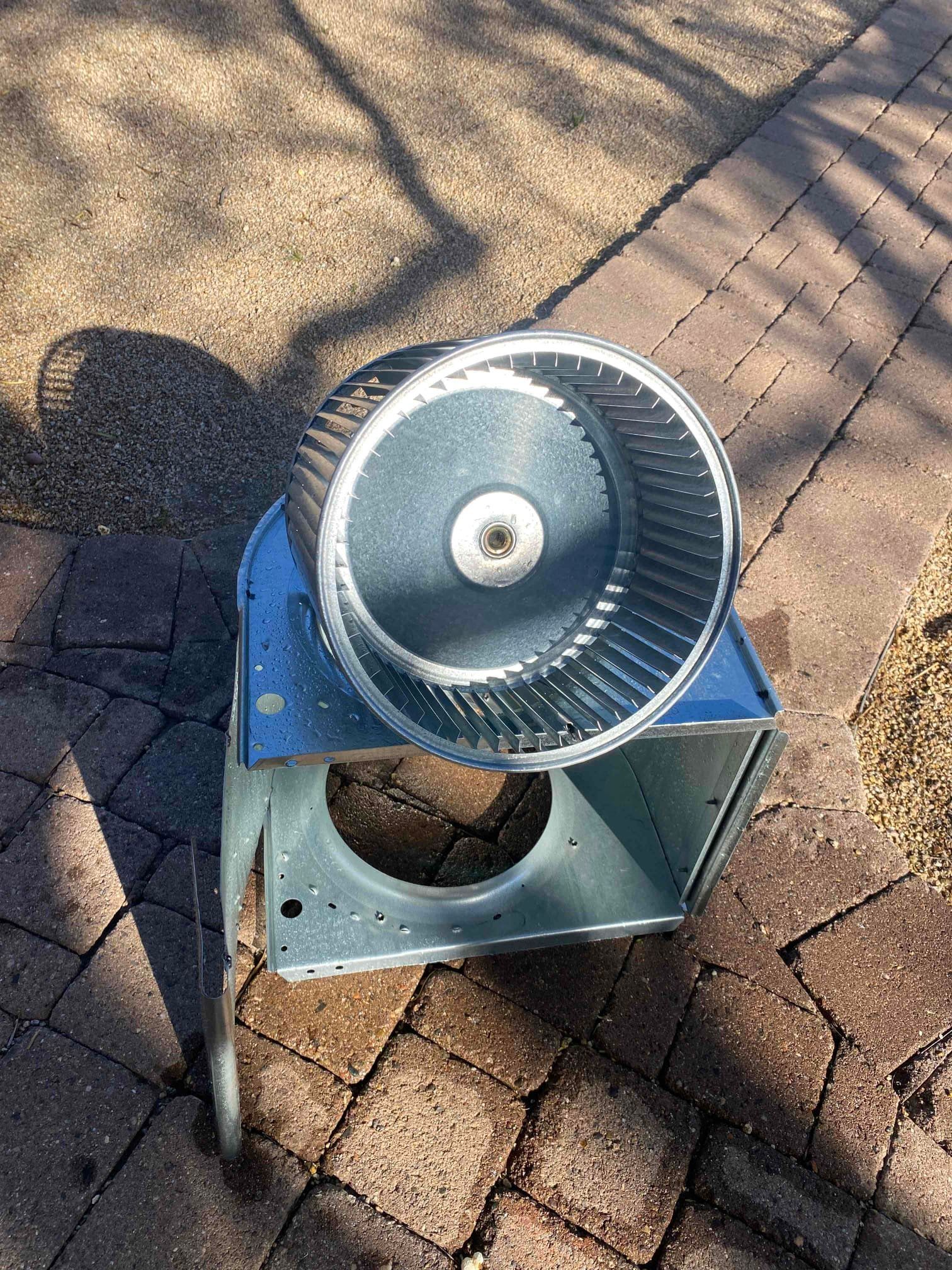
When homeowners in Phoenix think about HVAC maintenance, they often picture a quick filter change and a thermostat check. Unfortunately, many “maintenance” visits stop there — and that leaves one of the most important components of your system completely neglected: the blower wheel. At Way Cool Plumbing & Air, our HVAC maintenance includes a full blower wheel pull and clean, not a surface wipe. This extra step makes a measurable difference in comfort, efficiency, and system lifespan — especially in Phoenix’s extreme heat. If your AC struggles to keep up, your energy bills are rising, or your home feels unevenly cooled, a dirty blower wheel is often the hidden cause. What Is a Blower Wheel and What Does It Do? The blower wheel is the fan inside your HVAC system responsible for moving cooled air through your ductwork and into your home. Every room’s comfort depends on it. Over time, the blower wheel collects: Dust Pet hair Lint Construction debris Grease and residue from indoor air In Phoenix homes, where systems run long hours nearly year-round, buildup happens much faster than in cooler climates. When the blower wheel becomes dirty, airflow is restricted, forcing your system to work harder just to deliver the same amount of cooling. What Is a Blower Wheel Pull & Clean? A true blower wheel pull and clean means: Removing the blower assembly from the unit Fully extracting the blower wheel Deep-cleaning each blade Rebalancing and reinstalling the wheel properly This is not a quick spray or wipe-down. Many HVAC companies skip this step because it takes more time and skill — but skipping it means skipping one of the most impactful maintenance procedures available. Why a Dirty Blower Wheel Is a Big Problem in Phoenix 1. Reduced Airflow and Poor Comfort Phoenix homes rely on high airflow to fight extreme heat. A dirty blower wheel: Reduces air volume Creates weak airflow at vents Causes hot and cold spots throughout the house Even a thin layer of buildup can significantly reduce performance. 2. Higher Energy Bills When airflow is restricted, your system must: Run longer cycles Use more electricity Strain the motor and other components This directly increases your monthly energy bills, a major concern for Phoenix homeowners dealing with high summer utility costs. 3. Increased Wear and Early System Failure A dirty blower wheel puts excess strain on: The blower motor Bearings Capacitors Electrical components Over time, this leads to breakdowns and shortens the life of your HVAC system. Preventive maintenance is far cheaper than emergency AC repair in Phoenix during a heatwave. 4. Poor Indoor Air Quality A dirty blower wheel continuously circulates: Dust Allergens Pet dander Debris This can aggravate allergies and reduce indoor air quality — especially in tightly sealed Phoenix homes. Why Our HVAC Maintenance Includes a Blower Wheel Pull & Clean Many “AC tune-ups” in Phoenix are designed to be fast, not thorough. At Way Cool Plumbing & Air, we include a blower wheel pull and clean because: It restores proper airflow It improves cooling performance It lowers energy consumption It protects major system components It delivers real, measurable results This is especially important for: Older HVAC systems Homes with pets Homes with dust issues Systems that run year-round (most Phoenix homes) Signs Your Blower Wheel Needs Cleaning You may need a blower wheel pull and clean if you notice: Weak airflow from vents Rising energy bills with no usage change Longer cooling cycles Uneven temperatures in your home Excess dust buildup indoors AC system running constantly in summer If your system hasn’t had a blower wheel cleaning in years, or ever, it is almost certainly overdue. How Often Should a Blower Wheel Be Cleaned in Phoenix? For most Phoenix homeowners, e very 12 months is ideal. Homes with pets or heavy usage may need it more frequently. Older systems benefit significantly from annual cleaning. Because Phoenix HVAC systems operate far more hours than systems in cooler regions, maintenance intervals matter more here than almost anywhere else.
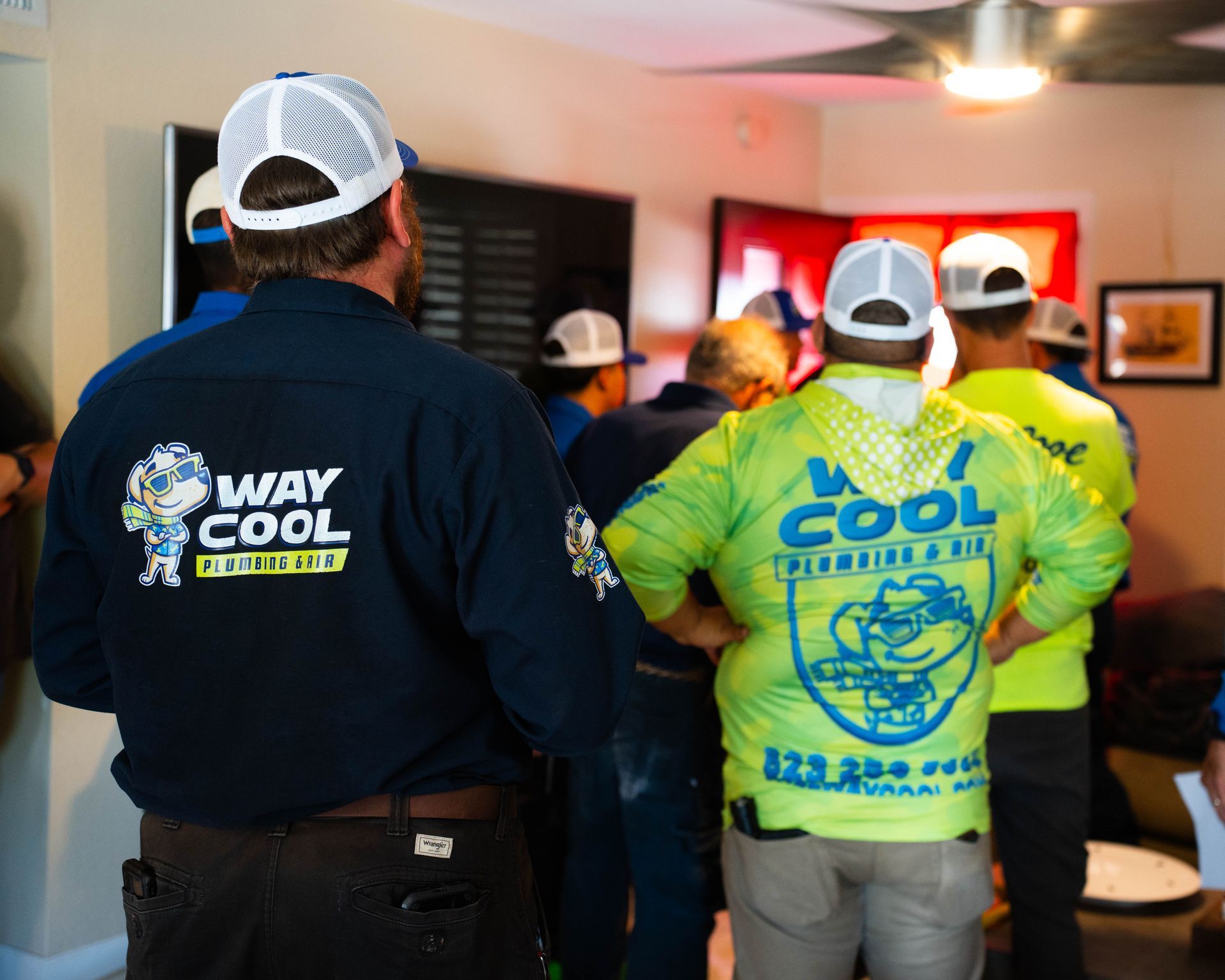
Phoenix, AZ - Way Cool Plumbing & Air, a longtime leader in HVAC services in the Valley, is proud to announce the expansion of its offerings to include comprehensive Home Performance services for residential homeowners. This expansion reflects the company’s ongoing commitment to help Phoenix, Glendale, and Scottsdale homeowners improve comfort, lower their energy bills, and enhance indoor air quality through a “whole-home” approach. Under the new Home Performance division, Way Cool now provides professional home energy audits, attic insulation upgrades, duct sealing, and indoor air quality improvements. These services complement the company’s well-known heating, cooling, and plumbing services, making Way Cool Plumbing & Air a one-stop solution for total home comfort and efficiency. “Many people don’t realize how much money they might be literally throwing out the window due to an inefficient home,” said Kirk Buscho, Owner of Way Cool Plumbing & Air. “We’ve added Home Performance services because we want to not only fix your AC or plumbing issue, but also address underlying problems in the home that cause discomfort and high energy bills. By performing detailed energy audits and offering solutions like insulation and air sealing, we can help customers save up to 30% on their energy bills while staying more comfortableaps.com.” Key features of the Home Performance services include: Whole-Home Energy Audits: Certified energy auditors use tools such as blower door tests, infrared cameras, and duct blaster tests to identify air leaks, poor insulation spots, and HVAC inefficiencies in the home. Homeowners receive a comprehensive report with findings and recommendations for improvement. “It’s an eye-opener for homeowners,” Buscho said. “Even in newer homes, we often find areas that can be improved.” Attic Insulation & Air Sealing: Given Phoenix’s extreme heat, attic insulation is critical. Way Cool’s team will evaluate current insulation levels and add high-quality insulation (or radiant barriers) to reach optimal R-value for our climate, typically in the R-38 to R-60 rangekinginsulation.com. They will also seal cracks and penetrations where conditioned air can escape. Properly insulating and sealing a home can dramatically reduce the workload on an air conditioner, extending its life and cutting energy use. Duct Repair and Sealing: Leaky ductwork is a common problem in many homes – often 20-30% of cooled air can escape through holes or loose connections. Way Cool’s technicians will inspect and seal duct systems, ensuring that cool air reaches the living spaces as intended. According to ENERGY STAR, duct sealing is one of the most impactful improvements for efficiency in warm climates. Indoor Air Quality Solutions: As part of its holistic approach, Way Cool is also offering upgrades like high-efficiency air filters, air purifiers, and UV germicidal lights. These options target dust, allergens, and biological contaminants – a significant benefit in Phoenix where dust storms and pollen can invade homesfivestar-airconditioning.com. “Energy efficiency and air quality go hand in hand,” noted Buscho. “A tight home is great for efficiency, but you also want to ensure the air you’re sealing inside is clean and healthy.” This launch comes at a time of rising interest in home energy efficiency. With utility costs on the rise and new federal and state incentives available for energy-saving upgrades, homeowners are increasingly seeking professional guidance to make their homes both eco-friendly and cost-effective. Way Cool’s home performance experts stay up-to-date on utility rebates (like APS and SRP programs) and federal tax credits so they can assist clients in taking full advantage of savings when they improve insulation, install high-efficiency HVAC systems, or take other qualifying actions. For nearly 25 years, the Buscho family’s company (formerly North Valley Mechanical) built a reputation for honest, high-quality HVAC service. The transition to the Way Cool Plumbing & Air brand last year signaled an expansion into plumbing; now, with the addition of Home Performance, the company offers a truly comprehensive suite of home services. Customers can have a single trusted contractor handle everything from fixing a leaking faucet to optimizing the entire house as an energy-saving system. “Our mission has always been customer comfort,” Buscho added. “Now we’re attacking that on all fronts – heating, cooling, plumbing, and the overall efficiency of the home. We want our customers to not only be comfortable, but to have peace of mind that they’re not wasting energy or money. It’s about doing the right thing for their wallets and for the environment.” To celebrate the launch of the Home Performance division, Way Cool Plumbing & Air is offering a $100 discount on a Whole-Home Energy Audit through the end of the year. The company will also host a free informational webinar on October 15, 2025, to educate homeowners about the benefits of energy audits and common efficiency upgrades for Phoenix homes. About Way Cool Plumbing & Air : Way Cool Plumbing & Air (formerly North Valley Mechanical) is a family-owned home services company based in Phoenix, AZ, serving the greater Maricopa County area. Established in 2000, Way Cool offers a full range of services including air conditioning and heating repair/installation, plumbing services, and now home performance and energy efficiency solutions. Known for quality workmanship and friendly service, Way Cool’s team of licensed technicians is dedicated to keeping “the Valley cool” and comfortable year-round. The company is an APS and SRP approved contractor for home energy audits and a proud participant in the EnergyStar Home Performance program.
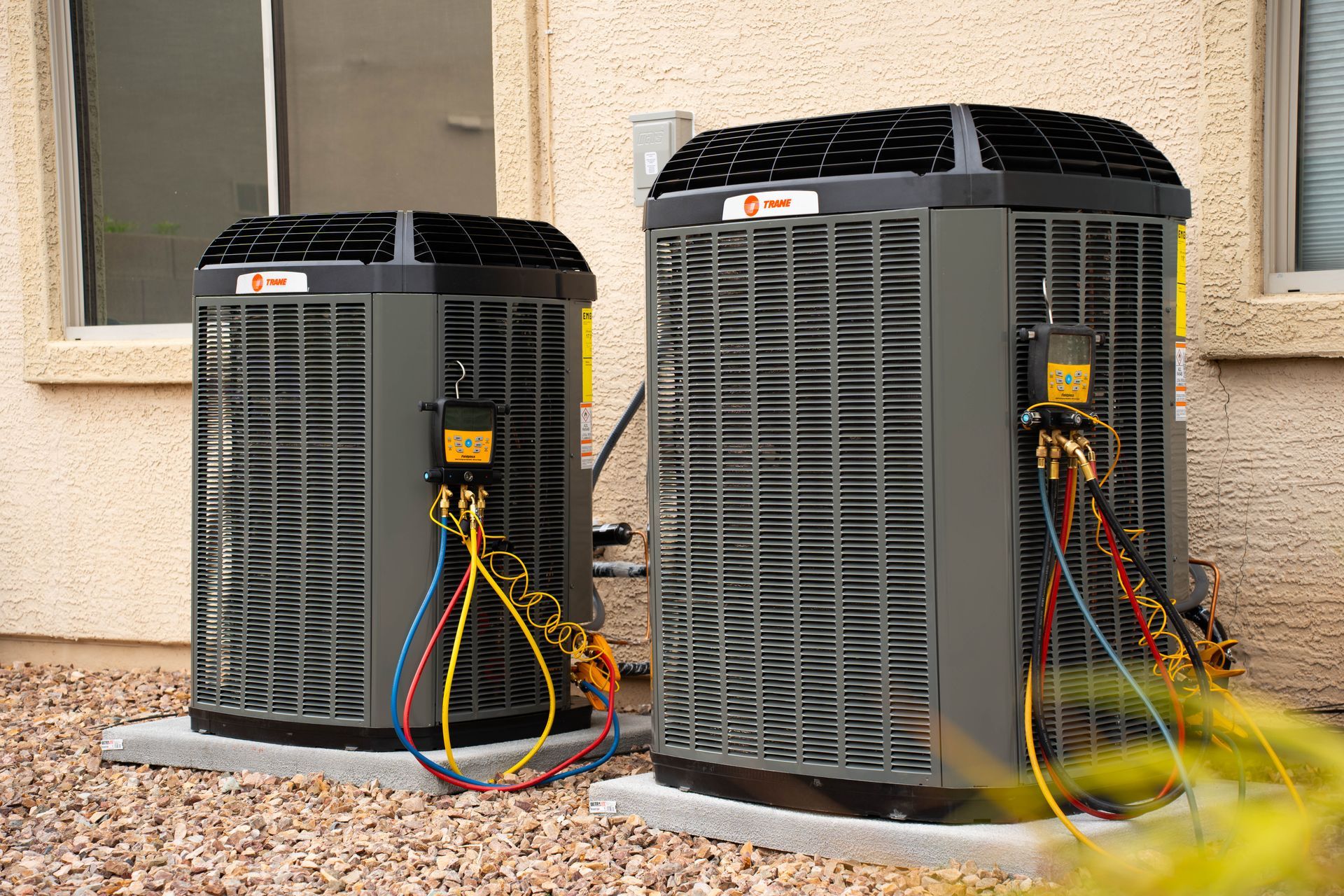
Q: What thermostat settings balance comfort and savings in summer? A: In Phoenix summers, every degree you raise your thermostat can make a noticeable difference on your bill. A commonly recommended setting is around 78°F (25.5°C) when you’re home and need cooling. At 78°F, most people feel reasonably comfortable with a fan on, and it significantly cuts energy use compared to, say, 72°F. When you’re away from home for work or errands, you can let it go warmer – perhaps 82–85°F. With a programmable or smart thermostat, you can schedule these setbacks so the house isn’t being fully cooled when empty. The key is not to let it get too hot if you’re only gone briefly, because the AC will work overtime to cool everything back down. But for longer absences, warmer settings are efficient. Also, use ceiling fans in occupied rooms – fans don’t actually lower room temperature, but the breeze makes you feel about 4°F cooler, which means you can be comfortable at a higher thermostat setting. (Just remember to turn fans off when you leave the room – they cool people, not the air). At night, some people can sleep with it a bit warmer, others prefer cooler; find your balance, but know that setting, for example, 75°F instead of 70°F at night will reduce the AC’s run time a lot. In winter, if you have heating on, almost the reverse logic: maybe aim for 68–70°F when home, and cooler (60s) when out or at night under blankets. Phoenix has mild winters, so heating costs are typically lower anyway. The bottom line: 78 is a good baseline for cooling when home, higher when you’re away, and take advantage of fans and natural cooling at night when possible. Q: Does it save energy to shut vents in unused rooms? A: It seems intuitive that if you don’t cool one room, more cooling will go to the rest of the house and you’ll save energy – but in practice, closing air vents in unused rooms is not recommended. Modern central AC systems are balanced to move a certain amount of air; closing a vent increases pressure in the ducts, which can actually create or worsen leaks and make the blower fan work harder. Studies have found that closing vents can increase energy consumption because the system’s efficiency is thrown offparkerandsons.comparkerandsons.com. It can also cause those closed-off rooms to build up heat and then that heat seeps to other parts of the home. In some cases, closing too many vents can even risk freezing the evaporator coil or damaging the compressor due to reduced airflow. A better approach if you want to vary temperatures room-to-room is zoned HVAC systems (with special dampers and multiple thermostats) or using a smart vent system that’s designed to modulate airflow (and even those have limits). But simply closing a vent or door in a standard system often backfires by causing pressure imbalancesparkerandsons.com. So, for efficiency and system health, it’s usually best to leave all vents open and let the system distribute air as designed. If you have a rarely used room, you can set the thermostat a bit higher overall and use a fan or room unit when someone is in there, but don’t try to micromanage by sealing off that room’s vent. Q: Are solar panels a good way to reduce energy bills in Phoenix? A: Solar photovoltaic panels are extremely popular in Arizona for good reason – we have abundant sunshine. By generating your own electricity, you can drastically cut your utility bills. For many homeowners, a correctly sized solar array can offset a large portion of their annual electricity use (especially all that AC use). Phoenix’s solar potential means systems here often pay for themselves in as little as 6-8 years through energy savings, and then you get essentially free power from then on (aside from minimal maintenance). There are also incentives: as of mid-2020s, there’s a federal tax credit (30% of system cost) and sometimes local or utility incentives for solar. Net metering policies (how you’re credited for excess solar power you send back to the grid) have changed a bit, but solar is still quite beneficial – even if full 1:1 net metering isn’t available, the power you produce during the day reduces what you need to buy. Additionally, solar can increase your home’s value. The main considerations: you need a good unshaded roof (south or west orientations are ideal here for afternoon sun). Also, initial costs are significant, though financing and lease options exist. If you plan to live in your home for several years and have high electric bills, solar is definitely worth exploring. It pairs nicely with other efficiency measures: first reduce your usage with efficiency, then produce the rest with solar. And if you’re concerned about outages, you might consider solar with a battery backup, which can keep critical appliances (like your fridge or some lights and the internet) running during a grid outage. In short, yes – Phoenix is one of the best places in the world for solar power, making it a top recommendation for reducing long-term energy costs. Q: What are some low-cost tips to make my home more energy efficient? A: Not every improvement requires a big investment. Here are some low or no-cost tips: Use sun shades or window films: About 30% of the heat in your home comes through windows. In Phoenix, sun screens (mesh window screens that block ~70% of solar gain) on west- and south-facing windows are very effective and relatively cheap. Even closing blinds or curtains during the day, especially on sunny sides, will keep your home cooler. Weatherstrip and seal: Get some inexpensive weatherstripping tape and seal the gaps on exterior doors. Use caulk to seal cracks around window frames, cable entry points, etc. Sealing little air leaks can cut cooling losses and keep hot air out. Efficient lighting: Swap out any remaining incandescent or old CFL bulbs with LED bulbs. LEDs use about 75% less energy and run cooler (important when you’re trying not to add heat indoors). Also, remember to turn off lights when not needed. Thermostat habits: If you don’t have a programmable thermostat, you can still manually adjust. Set reminders to nudge that thermostat up when you leave the house. Every bit helps. Or consider a smart thermostat – some utility companies even provide rebates or free smart thermostats because they know it saves energy. Use fans wisely: As mentioned, fans make you feel cooler. Use ceiling fans in rooms you’re in and you might be able to raise the AC temp by a couple degrees. Just turn them off when you leave. A fan costs only a tiny fraction of what an AC does to run. Unplug “vampire” devices: Electronics like TVs, game consoles, and chargers draw power even when off (a phenomenon called phantom load). Use power strips and turn them off when devices are not in use, or unplug things like phone chargers when not actively charging. It’s not huge, but it can save a few bucks a month and every bit counts. Laundry and dishwash smartly: Run full loads (half-loads waste water and energy). Use cold water for laundry when possible – modern detergents often clean well in cold. Run dishwashers and laundry at night to avoid heating the house during peak heat (and it could save on time-of-use energy rates if you have those). Air-dry clothes if feasible; the dry air here can dry clothes fast and reduce dryer use. Service your AC: While a tune-up might cost a little, simply keeping the filter clean is a no-cost must. A clogged filter can increase AC energy use by 5-15%. Also ensure your vents are open and not blocked by furniture for good airflow. These small steps, cumulatively, can shave a noticeable amount off your energy bills and make your home more comfortable. They’re a great starting point before considering bigger investments like new AC units or insulation. Q: Does using my pool pump at night save energy or money? A: It can, especially if you’re on a utility plan that charges different rates at different times (time-of-use plans). SRP and APS often have higher rates during peak hours (afternoon/early evening) and cheaper rates late at night. Running your pool pump in off-peak hours could save quite a bit if your rate plan supports that. Additionally, consider the pool pump’s efficiency: older single-speed pool pumps are energy hogs. Upgrading to a variable-speed pool pump can save a lot – often using 50-75% less energy, and utilities frequently offer rebates for them because they reduce overall grid demand. Running the pump the minimum necessary to keep the pool clear is also wise (many pools can stay clean with 4-6 hours of pumping a day if chemically balanced and if the pump is efficient, rather than the old standard of 8+ hours). And yes, nights are cooler so there’s slightly less evaporation and less chemical burn-off when circulating at night versus the intense sun of daytime. Just make sure the pump run times still sufficiently mix any chemicals you add (which you might do in the evening). Overall, aligning pool pump usage with low-rate hours and using an efficient pump is a smart move to cut costs in our climate where pools are common.
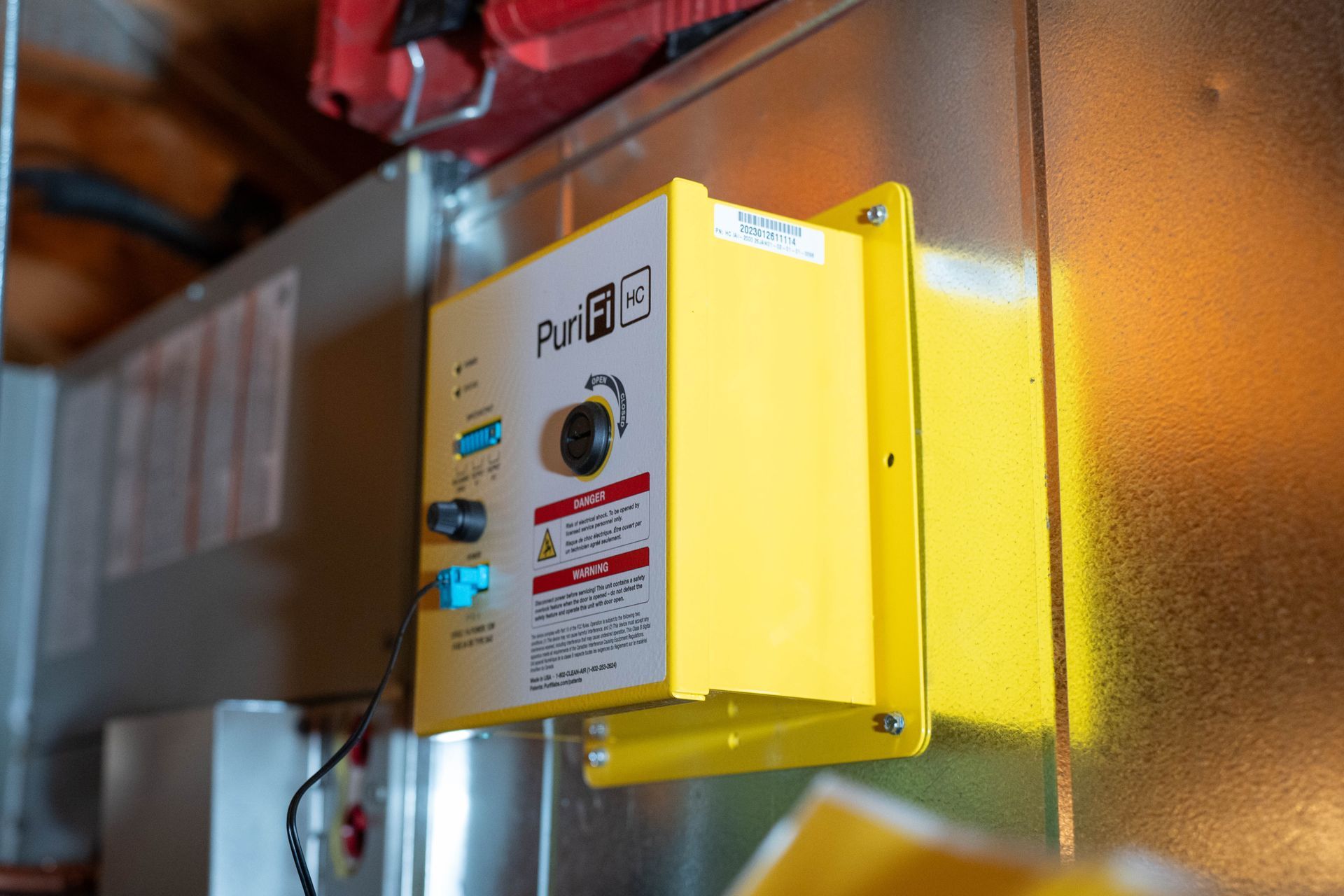
Q: Why is indoor air quality a concern in Phoenix? A: Phoenix might not have the smog of some cities, but we have our own challenges – mainly dust. Those dramatic desert dust storms (haboobs) you see in photos can send fine dust particles everywhere, including into our homes. Even with windows closed, ultra-fine dust can infiltrate through tiny gaps and ventsfivestar-airconditioning.com. This dust settles in our homes and HVAC systems and can aggravate allergies or respiratory conditionsfivestar-airconditioning.com. Moreover, Phoenix’s climate means we often keep homes sealed up (AC on for a good part of the year), which can lead to indoor pollutants (like chemicals from furnishings, or cooking fumes) accumulating inside. Pollen from desert plants, mold spores during monsoon humidity, pet dander – all can affect IAQ. In short, the combination of dust, outdoor allergens, and tightly closed houses makes indoor air quality something to pay attention to here. Many residents find that improving IAQ (with better filtration, air cleaners, etc.) leads to noticeably less dust on furniture and easier breathing, especially during allergy season. Q: What kind of air filter should I use for my AC to improve air quality? A: It’s recommended to use at least a MERV 8 to MERV 11 rated filter in your home HVAC system for better dust and pollen capture. The higher the MERV (Maximum Efficiency Reporting Value), the finer particles it can trap – but be careful not to go too high for your particular system, because very high MERV (13-16, HEPA-like) filters can be too restrictive and impede airflow if your system isn’t designed for them. Many Phoenix homeowners find a MERV 11 or 13 pleated filter strikes a good balance between filtration and airflow. If you have allergy sufferers at home or just want the best, you might consider an electronic air cleaner or an air purifier add-on in the HVAC system – these can capture even smaller particles, including some bacteria or viruses, using electrostatic plates or UV-C lights for germs. The key is to change filters regularly (a dirty high-MERV filter can actually worsen air quality by growing mold or reducing ventilation). Also, during dust storm season, you might need to change filters more frequently – those storms can clog an AC filter quicklyfivestar-airconditioning.com. So, choose a quality pleated filter that your system can handle, and keep it clean. It will reduce dust settling in your home and keep your HVAC system’s coils cleaner too. Q: What are some effective ways to improve indoor air quality? A: Aside from filtration through your AC, here are a few strategies: Source control: This means tackling pollutants at the source. For example, don’t smoke indoors (tobacco smoke is a major pollutant), use cooking exhaust fans to remove smoke/grease when cooking, and store chemicals/paints in a garage or outside, not in living areas. Ventilation: Bringing in fresh outside air is important, even in hot weather (you can do this briefly in early morning hours or use a ventilator system). Many newer AC systems can integrate an economizer or fresh air intake that introduces outside air in controlled amounts. Even opening windows for a short time each day when feasible can help dilute indoor pollutants. Air Cleaners: Portable air purifiers with HEPA filters can clean the air in specific rooms (good for bedrooms or a home office). These are especially useful during high-pollen times or if there’s smoke (from wildfires, for instance). Choose one sized for your room and look for true HEPA designation. Humidity Control: While we normally have low humidity, during the monsoon the indoor humidity can creep up. Keeping indoor RH (relative humidity) between about 30-50% helps because higher humidity can lead to mold growth and dust mites. If you have a swamp cooler (evaporative cooler), be mindful that it raises indoor humidity – you may need dehumidifiers or to switch to AC during very humid days. Conversely, in ultra-dry times, a bit of humidity (using a humidifier to get to ~30%) can reduce dust static and respiratory irritation. Duct cleaning and coil cleaning: Periodically ensure that your ductwork and AC coils are clean. Dust and biological growth in ducts can recirculate pollutants. If your ducts are dirty or have mold, professional cleaning plus addressing the cause (like fixing any water leaks into ducts) is warranted. Also, the evaporator coil in your indoor unit should be cleaned during maintenance – a dirty coil can breed mold and distribute that into the air. Houseplants and other options: Some people use houseplants for natural air improvement – plants can absorb certain VOCs and also release oxygen. They are not a cure-all, but they don’t hurt (just don’t overwater them, as that can cause mold). There are also advanced solutions like UV germicidal lights inside the HVAC (to irradiate and prevent mold on coils) and photocatalytic oxidation systems that break down VOCs. These can be beneficial, though their impact varies. In summary, a combination of good filtration, regular cleaning (of both your home and HVAC), controlled ventilation, and removing pollutant sources will lead to the best indoor air quality. Q: Do I need a humidifier in Arizona? A: For much of the year, indoor humidity in Phoenix can drop very low (especially when the heat or AC is running, as both tend to dry the air). While not everyone minds the dry air, some people experience dry skin, irritated sinuses, or static electricity when indoor air is extremely dry (say below 20% RH). A humidifier can help in the cooler months when the heat is on, to maintain a comfortable humidity level. You might consider a whole-home humidifier that attaches to your furnace/air handler – it adds moisture to the air as the system runs. This is great in winter. However, in summer, we usually don’t need added humidity – in fact, we want the opposite, and the AC naturally dehumidifies to some extent. So if you do use a humidifier, be sure to turn it off as spring arrives and certainly off in summer. Too much humidity in a hot climate home can make it feel sticky and even encourage mold if it gets high enough. So, the answer is: maybe – for winter comfort. Many homeowners get by fine with portable room humidifiers as needed (in bedrooms at night, for example). If you have a piano or wood furniture that dries out, or health issues eased by humidity, a humidifier can be very useful. Just remember to maintain it (standing water in humidifiers can breed bacteria, so regular cleaning is important). Q: After a dust storm, what should I do for my HVAC and indoor air? A: Those haboob dust storms can be nasty. After one hits, the first thing to do is check your air filter – you’ll often find it coated in brown dust. Go ahead and replace it or clean it if it’s a washable type. If a lot of dust came indoors (you’ll know by the layer on your furniture), it might help to circulate the indoor air through the AC a bit more to filter it – you can run the fan-only setting for a few hours with a clean filter to capture residual dust in the air. Wipe down surfaces to remove settled dust so it doesn’t keep getting kicked back up. Also inspect your outdoor AC unit – during severe storms, debris or dust might clog the condenser coil fins outside. If it looks dirty, gently rinse it with a hose (with power off). For indoor air, you might consider running a portable HEPA air purifier for a day or two after a big dust event, just to snag the extra fine particles. Keep windows and doors closed until the outdoor dust truly settles – sometimes there’s a second wave. These storms don’t just make a mess, they can also irritate your lungsfivestar-airconditioning.comfivestar-airconditioning.com, so taking these steps will help get your indoor environment back to clean. If you frequently get dust storms, you may also consider adding a dust collection device or enhanced filter to your system (like an electronic air cleaner), as those can capture a higher percentage of those fine dust particles.
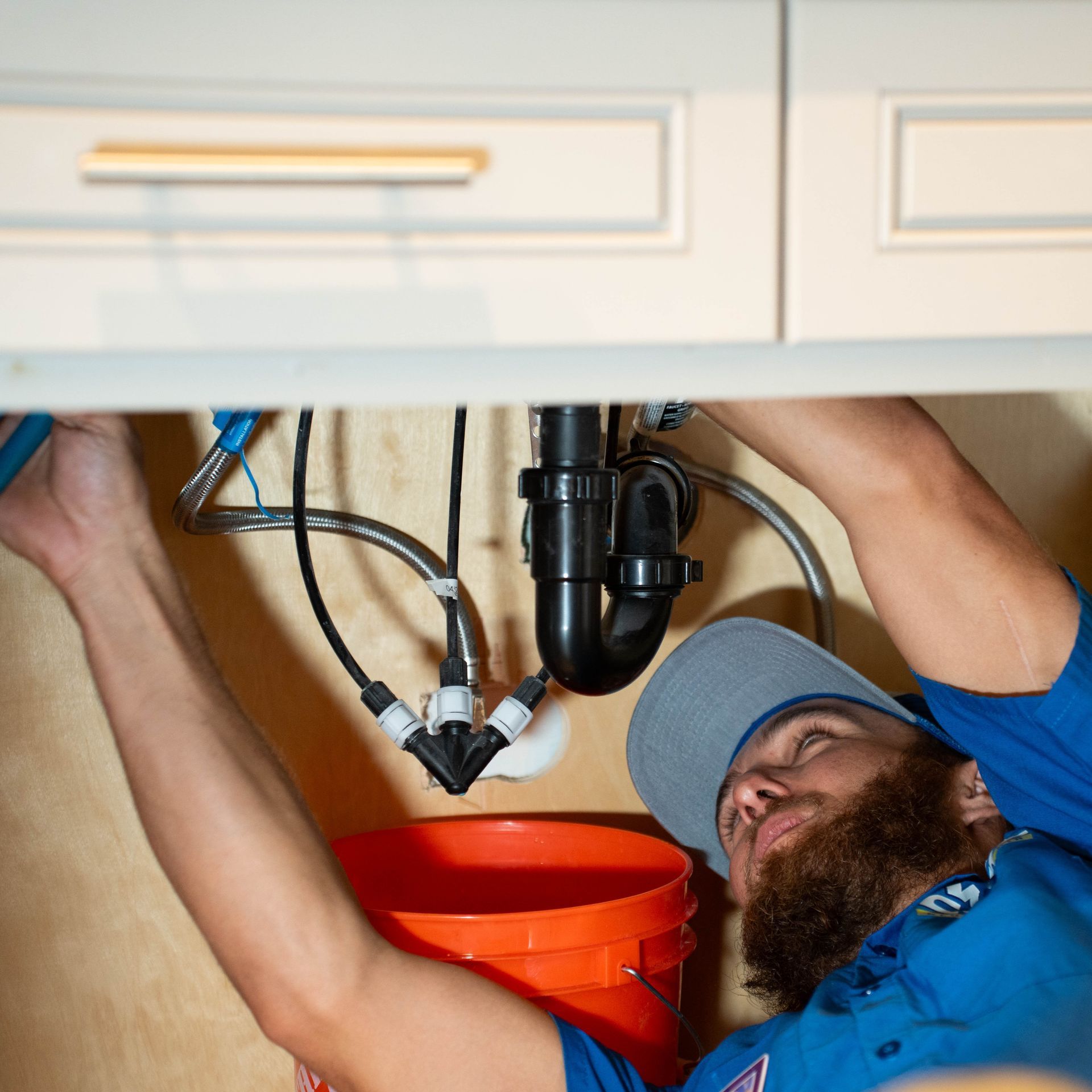
Q: Why is my water bill higher than usual? A: An unexplained spike in your water bill is often a classic sign of a hidden leak. Even small leaks, like a constantly running toilet or a dripping outdoor irrigation line, can add up to a lot of water. For perspective, the EPA notes that 10% of homes have leaks that waste 90+ gallons of water per daycorporate.homedepot.com – that would definitely show up on your bill. First, check the obvious culprits: toilets (is one running or refilling more than it should?), faucets (dripping taps), and outdoor spigots or hoses. Also look at your irrigation system if you have one – a broken sprinkler head or pinhole leak in a drip line might not be obvious but will waste water. Many Phoenix-area homes have water softeners or RO systems – check those for proper function, as malfunctions can sometimes leak to the drain. If you can’t find the cause, do a meter test: note your water meter reading, avoid using water for a couple of hours, then check again – if it moved and you’re sure no one ran water, you likely have a hidden leak somewhere in the plumbing. At that point, calling a leak detection professional can save time and prevent waste, as they have specialized tools to locate leaks (acoustic listening devices, infrared, etc.). Q: How can I detect hidden leaks in my home (walls, slab, etc.)? A: Detecting hidden leaks can be tricky, but there are some clues and techniques: If it’s a wall leak, you might notice a damp or discolored patch on drywall, peeling paint, or a musty smell (indicating mold growth). A slab leak (a leak in pipes under the concrete foundation) might show as unexplained puddles along the side of the house, areas of flooring that are warm (hot water line leak) or show moisture, or even foundation cracks in long-term cases. One method is to check the water meter with everything off as mentioned – many meters have a small leak indicator dial that spins if even a small amount of water is flowing. If that’s moving when no water should be in use, something is leaking. To narrow it down, shut off the house’s main valve – if the meter stops, the leak is on the house side; if it keeps moving, it may be in an irrigation line or between the meter and the house. For toilets, put a few drops of food coloring in the tank and wait 10 minutes – if the color seeps into the bowl, the flapper is leakingcorporate.homedepot.com. For listening: at night when it’s quiet, you might hear hissing in a wall or floor if a leak is significant. There are also affordable IR thermometers or thermal cameras that can sometimes spot a cool damp area behind a wall. Ultimately, if you suspect a hidden leak and can’t find it, it’s worth bringing in professionals – early detection can prevent major damage to your home and save water. Q: What should I do if I suspect a slab leak? A: A slab leak (a leak in the water lines running under your concrete floor) is serious and should be addressed promptly. If you suspect one – say you feel a hot spot on the floor (common with hot water line leaks), or you hear water running under the floor, or see floor damage – turn off your water supply to prevent further damage and call a plumbing professional experienced in leak detection. They will likely perform tests to confirm, such as pressure testing your lines and using acoustic equipment to pinpoint the leak under the slab. Do not ignore a slab leak: the water can erode soil under your foundation, potentially causing settling or cracks, not to mention it can breed mold or damage flooring. Once located, common repair options are: jackhammering the slab at the leak spot to fix the pipe, or sometimes re-piping or rerouting the line (which means abandoning the leaky underground section and running new pipe through walls/attic). There’s also a newer method called epoxy pipe lining where they coat the inside of the pipe to seal leaks, but it’s not always applicable. Your plumber will recommend the best fix. It’s a messy issue, but catching it early will minimize the collateral damage to your home. Q: How do plumbers find leaks without tearing out all the walls? A: Plumbers today have sophisticated leak detection tools. One common device is an electronic amplifier – essentially a highly sensitive microphone – that can pick up the sound of water escaping under pressure (like a hiss or whoosh) through concrete, walls, etc. By moving the sensor around, they can triangulate where the sound is loudest, pinpointing the leak’s location so they only need to open a small section. There are also thermal imaging cameras which can detect temperature differences – a cold water leak might show a cool blue spot on a thermal camera image on a wall or floor, for example. For sewer or drain leaks, plumbers use video inspection cameras snaked through the lines to visually find breaks or roots intrusion. Another technique for certain cases is using tracer gas – they’ll inject a harmless gas (nitrogen/hydrogen mix) into the plumbing and then use detectors to see where it’s coming out. But typically for residential water lines, acoustic and thermal methods are the go-to. These tools mean a minimally invasive approach: instead of tearing out large sections of drywall or slab to hunt for a leak, they can often zero in on the leak’s spot within a few inches. Q: What steps can I take to prevent leaks in my plumbing system? A: Some leaks are tough to prevent (things just wear out), but maintenance and a few practices can greatly reduce your risk: Watch your water pressure: High water pressure puts stress on pipes, fixtures, and appliance hoses. The pressure in Phoenix-area municipal supplies can be on the higher side. Use a pressure regulator (and check it periodically) to keep home pressure around 50-70 psi. This helps prevent pipe bursts and fixture leaks. Soften hard water: Our hard water leads to mineral buildup that can corrode pipes and eat away at water heater tanks and fixtures. If you install a water softener, it can extend the life of your plumbing by reducing scale and corrosion. Just be sure to maintain the softener so it works effectively. Replace rubber washing machine hoses: These can burst and leak catastrophically. Use braided stainless steel hoses for washing machines, dishwashers, and ice makers – and inspect them annually. They’re much less likely to fail. Don’t ignore small drips: That tiny drip from a faucet or under a sink may seem minor, but it can worsen unexpectedly or indicate a bigger issue. Fixing leaks early (often a cheap washer or cartridge replacement) prevents water damage and wasted water. Seasonal prep: Even though Phoenix doesn’t get deep freezes often, we do get occasional overnight freezes. Insulate any exposed outdoor pipes or hose bibs in winter to prevent freeze cracks. Regular inspections: Every now and then, look under sinks, behind toilets, around your water heater, and along visible plumbing lines for any signs of moisture or corrosion. Catching a weeping joint or a rusty flex hose and replacing it proactively is far better than waiting for a flood. Know your shut-offs: In case something does leak or burst, know where your main water shut-off valve is (and individual fixture shut-offs). Being able to quickly turn off water can save your home from major water damage in an emergency.
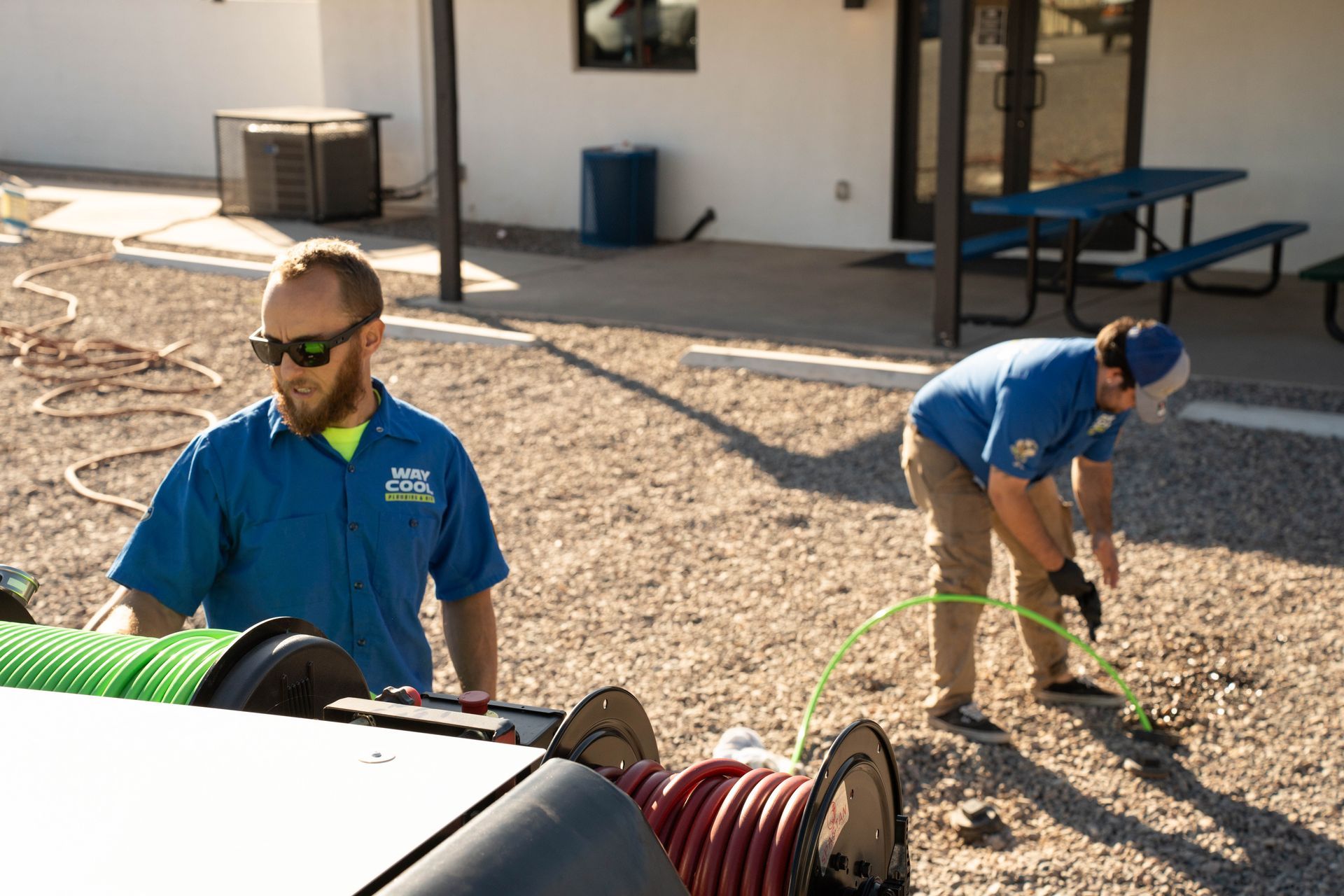
A professional-grade drain auger used by plumbers can cut through tough clogs safely, unlike harsh chemicals. Professional tools like this ensure thorough clearing while protecting your pipes from damage. Always consider calling a plumber for stubborn clogs to avoid pipe damage and recurring issues. Q: My sink/shower drain is slow or clogged – what are my options to clear it? A: First, try simple methods: a plunger can often dislodge minor clogs (just make sure to cover any overflow openings and get a good seal). For sinks, removing and cleaning the stopper or trap (the U-shaped pipe under the sink) can clear localized clogs like hair or debris stuck near the top. If that doesn’t work, a homeowner-safe tool is a handheld drain snake or barbed plastic drain stick for sinks and tub drains – these can pull out hair clumps especially. Avoid using standard dish detergents or hot water for grease clogs; sometimes very hot water can help flush a grease clog, but be cautious. If these don’t resolve it, it might be time to call a professional plumber who can use an electromechanical drain auger (snake) to cut through the clog, or perform a hydro-jetting if it’s a severe blockage in a main line. Professionals also have inspection cameras to see what’s causing the trouble. Tip: If multiple fixtures are backed up at once (say, toilet and shower together), that points to a main sewer line clog – in that case, skip the DIY and call a plumber right away. Q: Is it safe to use chemical drain cleaners? A: Be very careful with chemical drain cleaners. The common over-the-counter drain clearing liquids (with sodium hydroxide or sulfuric acid) can sometimes eat through a minor clog, but they carry risks. They are highly corrosive – not only to the gunk in the pipe, but also potentially to your pipes themselves. Chemical cleaners can damage PVC plastic pipes, and corrode older metal pipes (galvanized steel, copper, etc.)ajperri.com. In fact, if the drain is completely blocked, pouring a chemical cleaner can result in the caustic chemical just sitting in your pipe against the clog and pipe walls, which can “eat” the pipe materialajperri.com. They’re also dangerous to you – the chemicals can cause burns and produce harmful fumes. Plumbers often consider these products a quick but risky fix; if they don’t work, you end up with a pipe full of toxic liquid that someone (the plumber) has to deal with. Enzymatic drain cleaners (which use natural enzymes/bacteria) are safer but work slowly on organic buildup. In general, mechanical removal (plunging, snaking) is preferred. If you do use a chemical cleaner, use it sparingly and follow the directions exactly. And never mix different drain chemicals or pour them after other household cleaners – that could cause a dangerous reaction. Q: What causes drains to clog, and how can I prevent it? A: Common culprits for clogs: hair (in showers and bathroom sinks), grease and food scraps (in kitchen sinks), soap scum and hard water minerals (which build up in pipes over time), and for toilets, things like wipes or too much paper. In Arizona, our water is very hard – meaning it has lots of minerals – which can contribute to slower drains over the years as scale builds up inside pipes. To prevent clogs: Use drain strainers: Catch hair and debris before it goes down the drain. Simple mesh strainers in shower/tub drains and bathroom sinks can reduce hair clogs dramatically. Dispose of grease properly: Never pour cooking grease or oil down the sink. Let it cool and solidify, then throw it in the trash. Grease is a top cause of kitchen pipe clogs as it solidifies inside pipes. Watch what goes in the disposal: Avoid putting fibrous or starchy foods (potato peels, celery, coffee grounds) down the garbage disposal – they can create blockages. Run plenty of water if you use the disposal. Only flush appropriate items: Only human waste and toilet paper should be flushed. “Flushable” wipes are not truly safe for plumbing – they contribute to clogs. Hygiene products, paper towels, etc., belong in the trash. Regular maintenance: Occasionally flushing drains with hot water can help (for kitchen sinks, a kettle of boiling water can move along grease). Some people use a baking soda and vinegar treatment monthly as a mild, natural cleaner. If you have recurring issues, a professional drain cleaning once a year or so can preempt major clogs. Q: When should I call a plumber for a clogged drain? A: If your own efforts aren’t resolving it after a short time, it’s wise to call in a professional. Specifically, call a plumber if: multiple drains are backed up simultaneously (sign of a main line blockage), if one fixture is causing backup in another (for example, running the sink causes gurgling in the toilet – also a sewer line issue), or if foul sewage odors are coming from drains (could indicate a blockage or vent issue). Also, if water is coming up from a drain when you use another (like sewage backflow into a shower when the toilet is flushed), that’s an urgent sign of a main sewer clog – you’ll want a plumber with an auger or hydro-jet. Another time to call is if you dropped something valuable or important down the drain (like a wedding ring) – plumbers can often retrieve items using specialty tools or cameras. In general, don’t let a clog sit for days. A small clog can turn into a complete blockage if untreated, and standing water in pipes can lead to further complications. If basic methods fail, a plumber will solve the issue efficiently and help prevent damage to your plumbing system. Q: What is hydro-jetting and do I need it? A: Hydro-jetting is a professional drain cleaning method that uses high-pressure water streams to scour the inside of pipes. Think of a pressure washer hose snaked into your pipes, blasting away grease, scale, roots, and debris. It’s extremely effective for tough buildups, like years of grease in a kitchen line or invasive tree roots in a sewer line. Most homeowners won’t need hydro-jetting for routine clogs (a standard power snake usually suffices). However, if you have a persistent problem or an older sewer line that clogs frequently, hydro-jetting can restore the pipe to near-original diameter by thoroughly cleaning off the gunk and scale. It’s also a preferred method for commercial drains (like restaurant kitchen lines) due to heavy grease usage. One thing to note: hydro-jetting should be done by a trained professional after an inspection, because if a pipe is fragile or damaged, the high pressure could potentially worsen it. But in the right situation, hydro-jetting is a fantastic long-term solution to clear pipes and delay future clogs.
